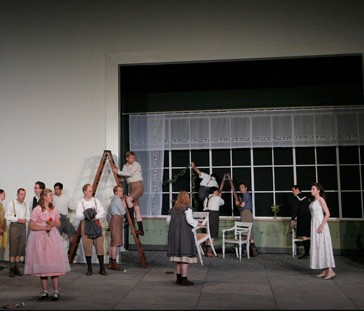Live from Aix 2010: Alceste

This article is the second in a series on the 2010 Aix festival. Read the other articles in our Culture section.
The second night of the Aix Festival belonged to Véronique Gens. The reed-slender, ethereally beautiful French soprano found every vocal and emotional nuance in the title role of Christoph Willibald Gluck’s Alceste, the mythological queen who offers herself as a substitute for her beloved husband King Admète, who is about to die at the whim of the capricious gods. Her stellar performance in the 1776 version of the opera rescues an otherwise woefully misguided new production by German director Christof Loy.
Loy’s premise is that the king’s subjects, abjectly distraught and confused by the prospect of the king’s impending death, are infantile in their helplessness. So he has turned what was originally the Greek chorus representing the people of Thessaly into a passel of kids, played by the adult members of the otherwise excellent English Voices choir: smock dresses, short pants and suspenders, high top shoes, Baby Janes and socks, hugging teddy bears and toy boats-proper little late 19th-century English-style schoolchildren. When they are not singing-beautifully-about Apollo, Artemis, Hades and the shades of death, they frolic, they tussle, they walk pigeon-toed, they spit on each other and in general look like complete idiots. As Loy puts it in the program notes, “choir=the people=children”. The conceit holds up for about five minutes, and then = big mistake. Eventually The Turn of the Screw comes to mind, as does the urge to shoo the monstrous children off the stage and get on with Gluck.
And of course that’s what Gens does. Singing of her love for Admète, she can bring an audience to tears with a few soft notes floated over the air or raise the grandstand rafters with her full-throated cries of fear and anguish. Canadian tenor Joseph Kaiser, best known as Tamino in Kenneth Branagh’s 2007 film version of The Magic Flute, provides solid support as Admète. Dutch baritone Thomas Oliemans does the best he can with a jokey cameo appearance as Hercules, and American baritone Andrew Schroeder is saddled with the role of the Grand Priest of Apollo ordering the citizens of Thessaly to pray-here that becomes a priest in clerical collar manhandling children and forcing them to the ground, which = an almost inevitable cheap shot.
Through it all the period-instrument Freiburger Barockorchester, conducted by Ivor Bolton, is impeccable.
Share to: Facebook Twitter LinkedIn Email
Leave a reply
Your email address will not be published. Required fields are marked *



